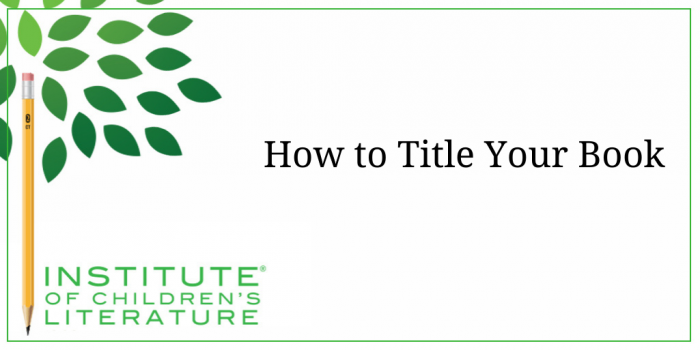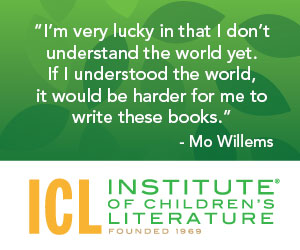1000 N. West Street #1200, Wilmington, DE 19801
© 2024 Direct Learning Systems, Inc. All rights reserved.

We teach our students how to write and get published!
View our Course Catalg >

Sometimes the title comes to you early, and you just always know what you want to call that story or book. Sometimes no matter how hard you try, you can’t seem to come up with a title that feels right.
When that happens, it can be good to think a bit about what a title can do:
So that doesn’t sound like much, does it? Yeah, it’s easy to understand why titles can be so hard. Let’s look at the things that titles do and how you might use that to help you come up with a title for your work in progress.
Prediction
Titles help a reader know if the book is the sort of thing he likes to read. So a reader who loves spooky books will be drawn to titles that hint at something spooky like The Last Kids on Earth, The Graveyard Book, The Empty Grave, and Shadow House: No Way Out all hint at the creepiness within. Children looking for stories that combine humor with the spooks will look for quirkier titles like The Notebook of Doom or Creepy Pair of Underwear! A book whose title gives no hint about the contents will have to rely on enticing the reader with the author’s name (which for most of us, is not that effective yet) or by the cover design or with the blurb on the back of the book. All of these secondary ways can work, but the title is often the first point of contact with the reader so giving the reader hints about the sort of book lies inside can be helpful.
The younger the reader, the more important it is for titles to reflect something about the content. Very young children won’t catch on to more obscure titles that work fine for teens. You wouldn’t find a children’s book called An Abundance of Katherines unless it was actually about a whole bunch of Katherines doing something interesting, but it worked very well for a young adult book by John Green about a young man who was unlucky in love with a series of young women named Katherine. Young children can becomes upset if the title seems to promise one thing when the book gives the reader something else. Teens, on the other hand, are more open to titles that offer an interesting turn of phrase or literary allusion. Katherine Paterson’s Jacob Have I Loved is a Scripture quote, as is Lois Lowry’s Number the Stars. John Green’s The Fault in Our Stars comes from Shakespeare’s Julius Caesar.
So think about what your book is truly about so that you can choose a title that helps the interested reader find it and identify it. What is the genre? What is the mood of the book: serious? comic? tense? romantic? What is the most interesting thing about the book? When thinking about a title, it’s good to think about what elements of the story are more tempting for the reader. For instance, a story that takes place on a pirate ship might be scary or sad or funny or adventurous, but it’s also on a pirate ship. Since pirate ships are inherently interesting, a title that doesn’t take advantage of that could be missing out on an alluring element.
Key Words
Sometimes brainstorming key words can help you with a title. Think about what genre you’re working in and what you want to convey and make a list (a nice long list) of all the words you can think of that convey that. For example, if you’re wanting to convey that a title is spooky, obviously words like “graveyard” or “haunting” will work, but so will “darkness” and “chill.” Making your brainstorming list long will let you consider choices that are more interesting and less likely to be a repeat of a pre-existing title. Again, keep in mind that the older the reader, the more obscure the title can be. If you’re writing a mystery book for an elementary aged child, you’re probably going to want to include words like “mystery,” “detective,” “clue,” or “case,” while an older reader might simply make use of some kind of mysterious language like “missing” or a play on words like “dead ahead” or “dead of night” or “dead silent.”
Once you’re made up your key words based simply on genre or tone, consider key words that are true of your book specifically. Does it take place mostly on a farm? What would be keywords connected with that: reaping, sowing, manure, growth? Make your list long and sort them by what mood is conveyed with the word. A scary story taking place on a farm might easily include “reaping” which can have spooky connotations, while a silly story taking place on a farm might consider “manure” since there are two words that are sure to make young kids giggle: underpants and poop. Again, a play on words can hint at a playful story or a more serious ones depending upon the words you choose.
It’s good to consider all the baggage that comes with any given word choice. For instance, a camera shot is not a particularly scary thing, but because the word “shot” comes with the baggage of guns and danger, The Camera Shot might be a perfect book about a photographer who finds herself pursued by a dangerous foe.
Catching Interest
Whatever title you choose, it’s important to keep in mind that the primary job of a title is to grab interest. So think carefully about your title. There are some choices you can make that will kill interest instead of catching it. Avoid the title that gives away an important secret of the story. Your story might be about Kelly catching a criminal, but Kelly Catches A Crook is probably not the best title since it sums up the story instead of hinting at it. Don’t give away the ending in the title. For instance, a book about the harrowing experience of a tiny kitten lost in a storm and in need of a home really shouldn’t be called Kitty Finds a Home. A more effective choice might be Lost Kitten or Storm Kitten or even In the Midst of the Storm. Title by the most interesting part, not the ending.
Another interest killer is the title that tells the kid he’s sure to learn something from this story. Most kids aren’t really looking for lectures in literary form so titles like Kelly Learns to Care or Kelly Tells A Lie are probably not going to work as a good kid lure. (Some publishers who produce books that basically are meant to be lessons will have whole lines with titles like that, but most trade publishers would rather see the lure than the lecture in your title choice.)
Having said all that. Title can be tough, but with a little brainstorming and thought about what makes your story interesting, and you’ll find titles becomes more of a challenge and less of a road block.
With over 100 books in publication, Jan Fields writes both chapter books for children and mystery novels for adults. She’s also known for a variety of experiences teaching writing, from one session SCBWI events to lengthier Highlights Foundation workshops to these blog posts for the Institute of Children’s Literature. As a former ICL instructor, Jan enjoys equipping writers for success in whatever way she can.
1000 N. West Street #1200, Wilmington, DE 19801
© 2024 Direct Learning Systems, Inc. All rights reserved.
1000 N. West Street #1200, Wilmington, DE 19801
© 2024 Direct Learning Systems, Inc. All rights reserved.
1000 N. West Street #1200, Wilmington, DE 19801
© 2024 Direct Learning Systems, Inc. All rights reserved.
1000 N. West Street #1200, Wilmington, DE 19801
© 2025 Direct Learning Systems, Inc. All rights reserved.
1000 N. West Street #1200, Wilmington, DE 19801
©2025 Direct Learning Systems, Inc. All rights reserved. Privacy Policy.
1 Comment